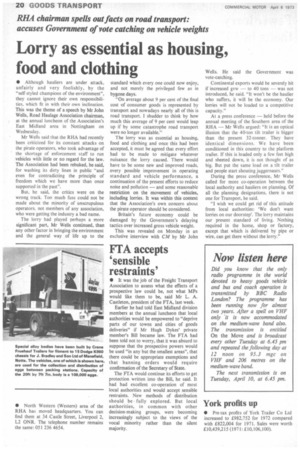RHA chairman spells out facts on road transport: accuses Government of vote catching on vehicle weights
Page 22

If you've noticed an error in this article please click here to report it so we can fix it.
Lorry as essential as housing, food and clothing
• Although hauliers are under attack, unfairly and very foolishly, by the "self-styled champions of the environment", they cannot ignore their own responsibilities, which fit in with their own inclination. This was the theme of a speech by Mr John Wells, Road Haulage Association chairman, at the annual luncheon of the Association's East Midland area in Nottingham on Wednesday.
Mr Wells said that the RHA had recently been criticized for its constant attacks on the pirate operators, who took advantage of the shortage of enforcement staff to run vehicles with little or no regard for the law. The Association had been rebuked, he said, for washing its dirty linen in public "and even for contradicting the principle of freedom which we have more than once supported in the past".
But, he said, the critics were on the wrong track. Too much fuss could not be made about the minority of unscrupulous operators. not members of any association, who were getting the industry a bad name.
The lorry had played perhaps a more significant part, Mr Wells continued, than any other factor in bringing the environment and the general way of life up to the standard which every one could now enjoy, and not merely the privileged few as in bygone days.
"On average about 9 per cent of the final cost of consumer goods is represented by transport and nowadays nearly all of this is road transport. I shudder to think by how much this average of 9 per cent would leap up if by some catastrophe road transport were no longer available."
The lorry was as essential as housing, food and clothing and once this had been accepted, it must be agreed that every effort had to be made to mitigate whatever nuisance the lorry caused. There would have to be some new and improved roads, every possible improvement in operating standard and vehicle performance, a continuation of the present efforts to reduce noise and pollution — and some reasonable restriction on the movement of vehicles, including lorries. It was within this context that the Association's own concern about the pirate operator should be considered.
Britain's future economy could be damaged by the Government's delaying tactics over increased gross vehicle weight.
This was revealed on Monday in an exclusive interview with CM by Mr John Wells. He said the Government was vote-catching.
Continental exports would be severely hit if increased gvw — to 40 tons — was not introduced, he said. "It won't be the haulier who suffers, it will be the economy. Our lorries will not be loaded to a competitive capacity."
At a press conference — held before the annual meeting of the Southern area of the RHA — Mr Wells argued: "It is an optical illusion that the 40-ton tilt trailer is bigger than the present 32-tonner. They have identical dimensions. We have been conditioned in this country to the platform trailer. If this is loaded only a few feet high and sheeted down, it is not thought of as big. But put the same load on a tilt trailer and people start shouting juggernauts."
During the press conference, Mr Wells called for more co-operation between the local authority and hauliers on planning. Of all the planning designations, there is not one for Transport, he said.
"I wish we could get rid of this attitude from local authorities: 'We don't want lorries on our doorstep'. The lorry maintains our present standard of living. Nothing required in the home, shop or factory, except that which is delivered by pipe or wire, can get there without the lorry."












































































































